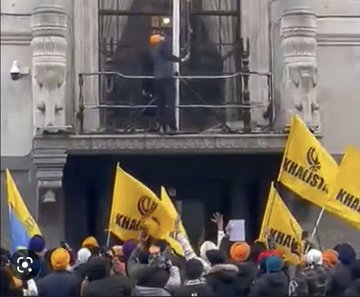NEW DELHI: The British government is yet to locate and bring charges against the people or organisations responsible for the 19 March assault on the Indian High Commission in London, despite more than two months having passed.
Around 50 individuals, chanting pro-Khalistan slogans, had entered the high commission building and pulled down the Indian Tricolour. They fled only after the police reached the spot at 1.50 p.m. local time, but not before the extremists had broken glass and other building structures.
Within days of the attack, the Indian agencies had informed the British government of at least seven individuals who were part of the attack. The individuals who were identified by the Indian agencies were Avtar Singh Khanda, Gurcharan Singh, Jasvir Singh, Harjeet Singh, Manroop Singh, Mandeep Singh and Rajinder Singh.
Of these seven, the first three are well-known Khalistani activists. Avtar’s and Gurcharan’s links with Pakistan’s intelligence agency, Inter-Service Intelligence (ISI), are well documented by Indian agencies.
On 21 March, a few Indian news channels wrongly reported that Khanda had been arrested by London police. This was denied by Khanda himself, who on 24 March released a video in which he was seen giving a statement while roaming free. According to sources, the London police had detained one individual for “violent disorder” post the attack, but was freed the same day.
On 14 April, The Sunday Guardian had reached out to UK officials, including the London Metropolitan Police, seeking details of the action taken, if any, against the perpetrators involved in the High Commission attack. The request was turned into a Freedom of Information request (similar to Right to Information request), under which the sought information was to be provided within 20 days. Later, the deadline was extended by another 20 days. However, the London police is unlikely to share this information citing exemptions under the relevant UK law.
Officials in the counter-terror departments in New Delhi said that it was hard to believe that the UK police, which has all the modern tools of tracking and identifying criminals, was unable to find and arrest those who had attacked the high commission, while stating that the perception that the British government agencies were deliberately not arresting them was getting stronger.
As a response to this incident, the Rishi Sunak government has posted two security guards outside the Indian high commission building. This arrangement will be reviewed every quarter, based on the threat perception. Providing security guards outside embassies, unlike in India, is not a general practice in the UK.
Coincidentally, when the vandals had attacked the high commission, a security team from India was also there. They had gone there for a separate purpose. The vandals were not aware of this and it was this Indian contingent that thwarted the radicals from doing any more damage.
The UK government, sources said, is quite upset with the Indian government’s decision not to release Jagtar Singh Johal, another alleged Khalistani terrorist, who has been in Indian custody since November 2017. Sources said that giving the vandals a free hand could be a part of the UK agencies to get back at India for this tough stand on Johal, who comes from a community that commands a lot of influence among UK politicians.
The attack on the Indian High Commission came after police in Punjab launched a manhunt to capture Khalistani supporter Amritpal Singh.
Two months on, UK still not probing attack on Indian High Commission
- Advertisement -

